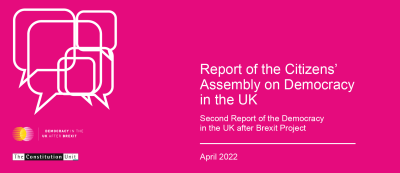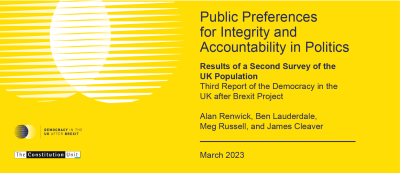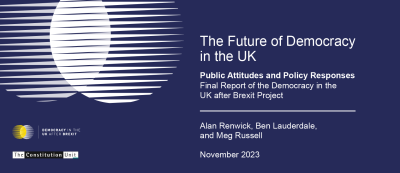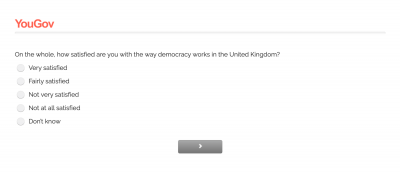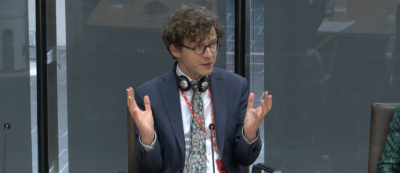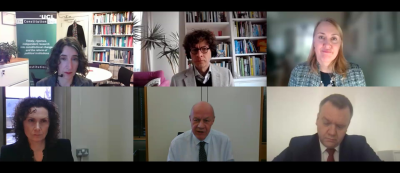A project examining public attitudes to democracy in the UK today through surveys and a citizens’ assembly.

The UK’s democratic arrangements were strained significantly during the Brexit process, with the proper roles of parliament, government, the courts, and the general public all strongly contested. At the 2019 general election, all of the major parties’ manifestos called for some kind of constitutional review. Since then, the COVID-19 pandemic has stretched the system afresh. Greater understanding of how people across the UK want the country's democracy to work is badly needed. This ESRC-funded research project is designed to provide that, through a combination of large-scale public opinion surveys and a citizens' assembly.
We have published four reports. The first details the findings of our first survey. The second reports on the Citizens’ Assembly on Democracy in the UK. The third details the findings of our second survey. And our fourth pulls all of these findings together, combining them with extensive new analysis and reflections on policy implications.
Reports
Project details
Background to the project
The project has examined public attitudes relating to three dimensions of democracy:
- Models of democracy: How do citizens in the UK now conceive the core values of democracy? For example, to what extent do they believe democracy should be representative or direct? Do they prefer it to be more majoritarian or more consensual?
- The culture of democracy: How do people expect democracy to be practised, by politicians, political institutions, and their fellow citizens? What behavioural norms should any reform seek to promote?
- Institutions of democracy: What do attitudes on models and cultures imply about citizens’ preferred roles for the executive, legislature, judiciary, and general public in future UK democracy?
The project has also investigated what factors influence variation in these attitudes. Are views on democracy related, for example, to people’s age, their educational experiences, or where they live? Are they related to which party they support or their attitudes on issues such as Brexit? Do people have views about democracy as such, or are their attitudes towards democracy ‘instrumental’, being shaped by processes they think will deliver their preferred policy outcomes?
Finally, the project explores the relationship between, on the one hand, the ‘baseline’ attitudes that people have when they have not been asked specifically to think about these issues before and, on the other hand, the 'deliberated' attitudes they have after having a chance to learn more and think things through. Do people’s views change through such a process? And can ‘deliberated’ attitudes have an impact on wider public opinion?
In pursuit of these questions, the project has three main elements:
- First, a large-scale survey was conducted in July 2021, asking a representative sample of the UK population about their views on democracy. This covered all of the matters set out above. You can view the questionnaire here.
- Second, a UK-wide citizens’ assembly explored a subset of these issues over six weekends between September and December 2021. This built on lessons from the Constitution Unit’s earlier Citizens’ Assembly on Brexit.
- Finally, a second survey, in 2022, repeated some questions from the first survey to see how stable people’s views are, and used an experimental design to test the impact of different kinds of messaging on people’s responses. You can view the questionnaire here.
 Close
Close



